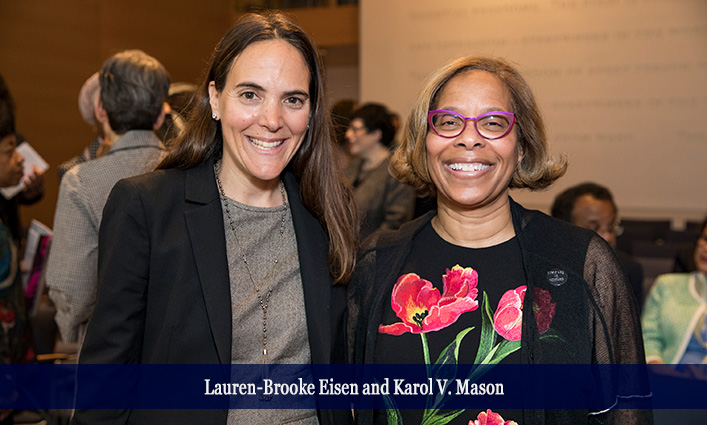
John Jay’s President Karol V. Mason was a featured speaker for the The Aspen Institute’s Conversations with Great Leaders Series, which was created in memory of esteemed businessman and philanthropist Preston Robert Tisch. The Aspen Institute, an education and policy studies organization, smartly chose Mason based on the talk’s theme, “To Form a More Perfect Union: Reforming the Criminal Justice System.”

Sitting in New York’s historic Roosevelt House, with an audience filled with John Jay students, faculty and staff, along with community leaders and local residents, Linda Lehrer, The Aspen Institute’s Director of New York Public Programs, kicked off the event. “The criminal justice system is not just about prisons, laws and those who break laws. It’s about race and opportunity—or lack there of,” said Lehrer. “It’s about injustice imbedded in the social structure. And, it’s about the kind of future we want for our community and democracy.” Then she invited Mason and Lauren-Brooke Eisen, a Brennan Center for Justice Senior Fellow, to dive deep into the problems and solutions surrounding our criminal justice system.
Reality on Race
Straightforward and compassionate, Mason didn’t pull any punches. “We can’t talk about these issues without talking about race. We’ve got to have real dialog, real conversations, and really listen to each other, and understand how our history has placed us in the situation where we are today,” said Mason. “I don't believe in people being criminalized for being young people. We've all made mistakes, it's part of adolescent development. The problem is, we give some young people the room to make mistakes, but we don't give black and brown children the room to make mistakes.”

“The problem is, we give some young people the room to make mistakes, but we don't give black and brown children the room to make mistakes.” — President Karol V. Mason
Staying Hopeful
When Eisen marveled at her unjaded perspective—even after years of working on criminal justice reform—Mason asked the John Jay students in the audience to stand up. “They’re the reason why I’m hopeful,” said Mason. “It is John Jay College of Criminal Justice, but it's a liberal arts institution. We've got lots of different majors in the house with us today. But they're all going to go out into the world with that understanding [of justice] and foundation of community.”

Effecting Change
When Eisen asked her, “What steps can we take to make the world a better place in the justice system?” Mason focused on where real change can occur. “What we all need to recognize is that most criminal justice issues are at the state and local level, not federal,” she said. “I used to say in the Obama administration, the bad news is, there's a limit to what the federal government can do. Today, I say the good news is, there's a limit to what the federal government can do.” Mason also encouraged people to avoid the rhetoric, noting that criminal justice reform was a bipartisan issue. “The Koch brothers are just as committed to this work as all of us in this room,” she said. “It’s the notion that this country is built on fairness and opportunity, and people committed to that are across the political spectrum.”

“What we all need to recognize is that most criminal justice issues are at the state and local level, not federal.” —President Karol V. Mason
Money Talks
Both Eisen and Mason talked about the staggering amounts of money going into the criminal justice system—80 billion dollars a year incarcerating people in the United States. And Mason asked the audience a question, “Do you know what we could do with 80 billion dollars? We could send every child to pre-K. There are so many things we could do with that money better than incarcerating people.” Mason continued saying she didn’t really care why people came to the issue of criminal justice reform—be it the expense, moral or religious concerns—as long as they acknowledge that there’s a problem and they want to help correct it. “We need to invest in our young people so they don't get caught in the criminal justice system. We need to be investing in education. We need to be investing in opportunity,” said Mason. “And when I say investing, I mean investing in our most challenged young people, who are our hope and our future.”
Click here to see the full conversation.



